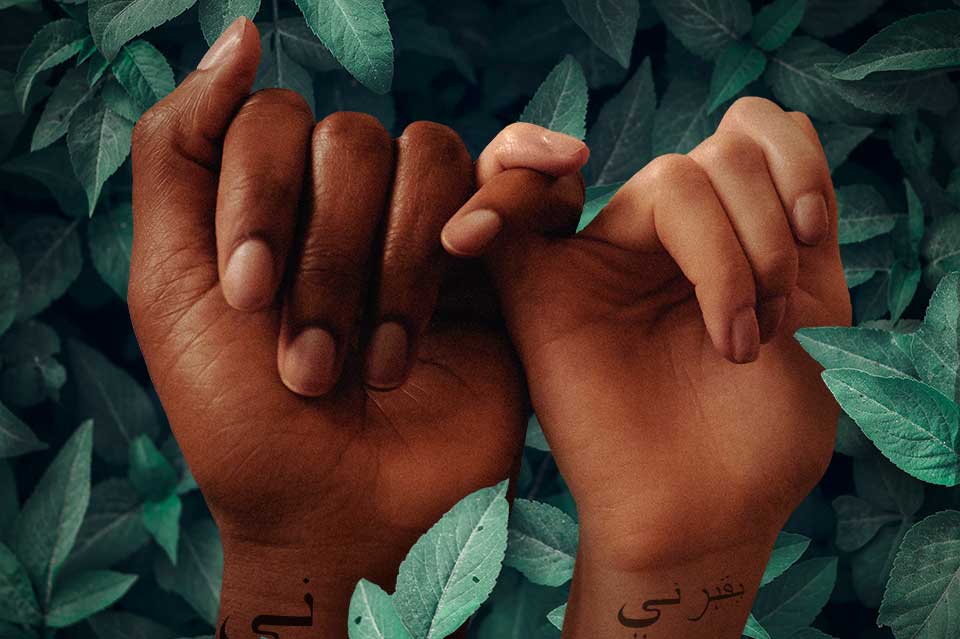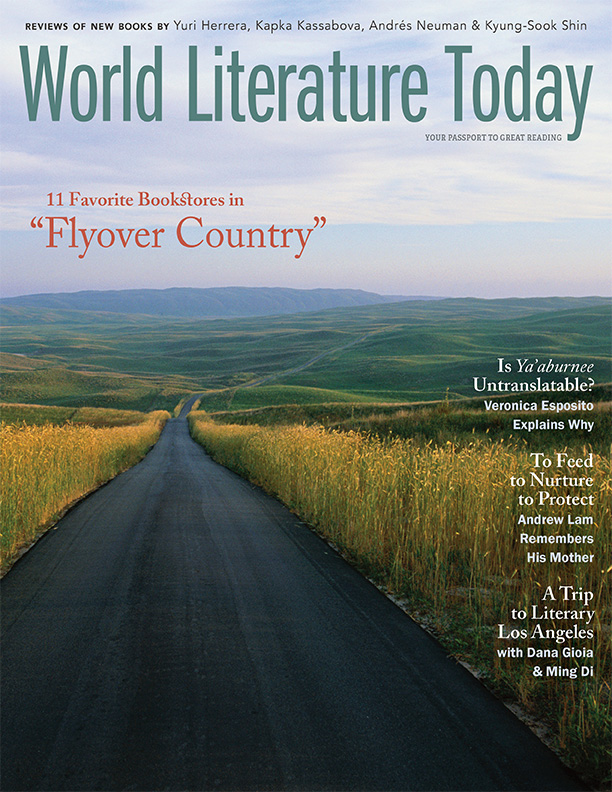Ya’aburnee
 In her new, ongoing column, Veronica Esposito highlights an untranslatable word—its history, its contemporary usage, and why it’s so hard to translate. To begin this new project, Esposito delves into the Arabic ya’aburnee, a commonplace expression of love typically rendered literally in English as “you bury me.” We hear it in a Halsey song and see it in play and poem titles and tattooed on bodies, this word that fills a gap to express a universal experience not reducible to a single English word.
In her new, ongoing column, Veronica Esposito highlights an untranslatable word—its history, its contemporary usage, and why it’s so hard to translate. To begin this new project, Esposito delves into the Arabic ya’aburnee, a commonplace expression of love typically rendered literally in English as “you bury me.” We hear it in a Halsey song and see it in play and poem titles and tattooed on bodies, this word that fills a gap to express a universal experience not reducible to a single English word.
Of all the things English does well as a language, it lacks words or phrases that are particularly inspirational when it comes to love and romance. Perhaps that helps explain why English speakers often become entranced by words from other languages that have a particular knack for capturing the rapture and exuberance that profound love can make us feel for another person.
A fascinating example of this is the untranslatable Arabic word ya’aburnee, typically rendered literally in English as “you bury me.” A commonplace expression of parental or romantic love, it is at first glance curious—you tell someone you love them by asking that they bury you? The unspoken implication of this word is that love makes life without you so impossible to contemplate that I hope you end up burying me instead of vice versa. Other, less literal translations include “I don’t want to live without you” or “I’d die for you.”
The word is attention-grabbing because it sounds so extreme and morbid, as well as for its paradoxical nature: I’m going to express my love for you by referencing the one thing that will sever us forever. The casual juxtaposition of love and death is uncommon in English—we tend to avoid talk of death, and we like to imagine ourselves as having a more innocent and idealistic approach to love. The one big exception—the common marriage vow “till death do us part”—tellingly doesn’t say who will die, and it certainly doesn’t express a wish to be the one who goes first, as does ya’aburnee. It’s more of an afterthought—yes, eventually death will have to part us—whereas ya’aburnee makes death the central focus. In the anglosphere, ya’aburnee also brings to mind the ultimate lovers—Romeo and Juliet—famed, of course, because their love was so powerful that they preferred to die than be apart.
Although untranslatable, ya’aburnee has caught on among English speakers both because it fills a gap and because it leans heavily on universals. Really, among those who have been in a lengthy, committed relationship, who hasn’t wondered at some point who will die first? The phrase is also universal for the way it makes “bury me” stand in for death—a very literal, bodily representation of death that leaves no room to ignore the fact of what it really is. Burying the dead is understood by humans across the globe—regardless of culture or developmental level, we all can relate in some way to burying our dead. Similarly, most human societies are familiar with the idealized, lifelong love: our cultural narratives tend to uphold lifelong monogamy as an ideal, and they also tend to have powerful narrative archetypes of the star-crossed lovers whose bond is only severable by death.
Really, among those who have been in a lengthy, committed relationship, who hasn’t wondered at some point who will die first?
As a word expressive of love and longing that fills a gap in English, ya’aburnee is similar to the word mamihlapinatapai, from the nearly extinct Yaghan indigenous language once widely spoken in Argentina’s far south, translated by Zoe Baillargeon as “a look shared by two people, each wishing that the other would initiate something that they both desire but which neither wants to begin.” Likely because this word both feels exotic and mysterious, and because it references a delicious moment of romance that most have experienced, it has taken on a life of its own—scores of articles have been written about it, YouTube is full of people extolling its raptures, and it even appears in the 1994 Guinness Book of Records (for the world’s “most succinct word”). There are others, like the Norwegian forelsket (the intense feeling of starting to fall in love), that have caught on to varying degrees among English-speakers. As with ya’aburnee, these words give us a way to grab onto aspects of love that are widespread but largely unnamed in our language; they also, notably, deal with the parts of love that feel the most vivid and fascinating—the beginning of love and the inevitable end of it.
It is this universality and this emotional power that makes a word like ya’aburnee easier to compactly render in English than other untranslatable words. Essentially, why ya’aburnee is impossible to translate is that there is no single-word English equivalent that neatly fits the cultural and semantic space that ya’aburnee inhabits, even if the concept can more or less be tidily summed up in brief, efficient English; translators can easily find decent approximations, but nothing in the English language fits as neatly and as cleanly as ya’aburnee fits into Arabic.
For an Arabic speaker, even more common than using ya’aburnee in romantic relationships is its use as an expression of love between parent and child, especially between mother and child. In fact, when ya’aburnee is spoken, it is most often done so between a mother and her dear one. In this context it takes on added connotations: generally, cultures view it as a tragedy of the highest proportions when a parent must bury a child, whereas the death of a parent is considered to be a natural, if extraordinarily difficult, part of the human experience. Thus, beyond an expression of the highest kind of love and dedication, ya’aburnee also strikes a chord of filial duty and the proper turn of generations as a parent brings up a child. When a mother tells her child “you will bury me,” she is really conveying a gentle, ordinary kind of love: a hope that her child lives out a normal and natural life, experiencing a stage of life that all children should live long enough to get to navigate.
Beyond an expression of the highest kind of love and dedication, ya’aburnee also strikes a chord of filial duty and the proper turn of generations as a parent brings up a child.
It is in this sense that pop superstar Halsey titled her popular song “ya’aburnee.” Her song is an ode to her young daughter, alternatively mourning the lost moments between mother and child and celebrating the fact that something of her will live forever in her offspring. It seems probable that that part of Halsey’s decision in choosing this word to title her song is the sense of novelty and mystery conjured by seeing ya’aburnee there in the track listing. (It’s this sense of mystery and novelty that also likely makes ya’aburnee a perennial favorite for tattoos.) This brings up another challenge to translating this word—what, to an English speaker, will seem surprisingly fresh and novel will to an Arabic speaker come across as just humdrum and everyday.
That freshness makes the word attractive for English speakers and probably contributes to ya’aburnee’s popularity as a motif for various forms of creative expression. In addition to the aforementioned tattoos and pop ballad, ya’aburnee is also the title of various other pop songs, several poems, a film, and a stage play. For instance, the Lebanese poet Zeina Hashem Beck titled her poem about raising her small daughter in a part of the world marked by extreme levels of warfare “Ya-aburnee.” The poem lovingly intersperses text about Beck’s bond to her young daughter with text evoking the death toll of ISIL’s attack on Mosul, twisting the two strands together to show how sorrow and love intertwine, how the world of family intimacy can be invaded by the large-scale forces of religious ideology and politicized violence.
A similar chord was struck by the stage play You Bury Me. Created by an Egyptian immigrant living and writing in the UK, the anonymous playwright Ahlam chose the English-language translation “you bury me” to be the title of her drama about romance among teens set against the bloody repression of the movement for democracy in Egypt during the 2010s. Inevitably, for an English speaker a word like “you bury me” will bring to mind martial connotations in an area of the world that has become synonymous with political violence—this was likely part of Beck’s and Ahlam’s purpose in so titling their works. Ahlam set her award-winning teen drama against the backdrop of young people “being disappeared, incarcerated, banished by a new military regime” in her native country. Like Beck, she juxtaposes powerful story lines of love with the large-scale political violence that interferes in lovers’ lives.
The great literary critic I. A. Richards once wrote that “translation probably is the most complex type of event yet produced in the evolution of the cosmos.” It is the meeting of two profoundly complex things—that is, the meeting of two human minds—and in that it has something in common with love. It is this great richness that gives both the potential to remain stimulating and compelling for a lifetime. Ya’aburnee is part of that shared language we have developed in an attempt to make this endless pursuit comprehensible on a human level. It is a way of expressing a feeling that often probably feels inexpressible, and in that it is appropriate that the words resists translation, even as it has become so beloved and widely used in a language beyond its native tongue.
Oakland, California















